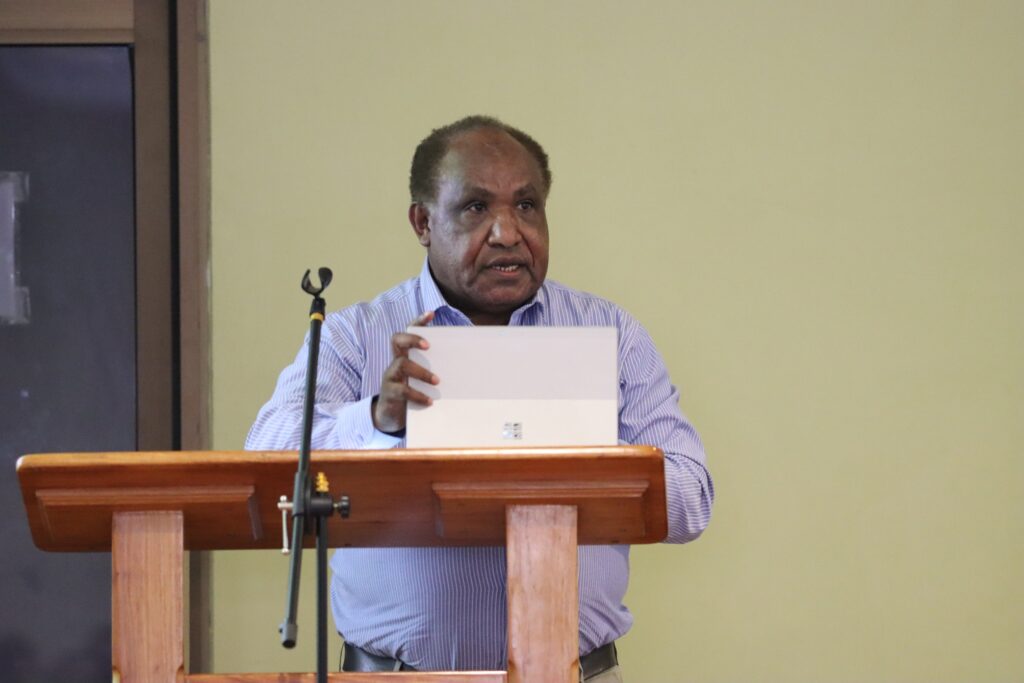Lae, Morobe Province, 10 April 2025 – The Chief Executive Officer of the Fresh Produce Development Agency (FPDA), Mark Worinu, has delivered a stirring address at the National Agriculture Industry Public–Private Sector Partnership Conference in Lae, urging the government, private sector, and development partners to rally behind transformative reforms in Papua New Guinea’s horticulture and fresh produce sector.
In a wide-ranging presentation that laid bare the structural weaknesses in policy, legislation, funding, and coordination, Mr Worinu argued that the FPDA—and the fresh produce industry at large—has matured and must now be backed by a solid policy and legislative framework if it is to fulfil its national potential.
“For decades, we’ve been operating without an overarching horticulture policy or legislative foundation. We’ve done what we can—but we’ve reached the limit. It is time for this industry to be recognised as a serious national asset and resourced accordingly,” said Mr Worinu.
From Project to Pillar
Established over 35 years ago as a simple donor-funded project, FPDA has evolved into one of PNG’s most active agencies delivering support to farmers, agribusinesses, and rural communities. Yet it still lacks statutory authority status—an institutional gap Mr Worinu believes is holding the sector back.
“FPDA is not a statutory authority. We were never legally institutionalised like other commodity boards. But we have come of age. We are working side by side with commodity boards to advance the government’s agenda—and we need formal recognition.”
Mr Worinu said that while FPDA has made significant headway with the implementation of its long-term strategic plan (2010–2030), the agency now needs legislative and financial backing to fully scale its programmes, improve food security, support import replacement, and boost household incomes in rural PNG.

Gaps in Policy and Planning
Highlighting a lack of coordination across national policy documents, he said critical frameworks such as the National Food Security Policy remain in draft form, the Nutrition Policy was taken over by the Health Department, and the NASP 2024–2033 has yet to be harmonised with the Medium-Term Development Plan.
“How can we build a food-secure nation when our policy framework is disjointed?” he asked. “We must align the NASP, nutrition and food security policies, and our own 20-year FPDA plan, so we can guide both government and investor action.”
He noted that the agency has delivered 11 annual operational plans and maintained a strong record of financial accountability, with audits completed by Deloitte and other auditors to ensure transparency in public expenditure.
Transformative Projects Driving Rural Impact
Mr Worinu pointed to the Market for Village Farmers project, funded by IFAD and the PNG Government, as an example of what’s possible with long-term planning and strategic partnerships. The project, which aligns with six key pillars of FPDA’s strategic plan, is now being scaled up following impressive results.
“Our planning philosophy is simple—don’t chase small, short-term projects. They won’t move the needle. We must pursue mega, transformative projects that cut across the strategic plan and bring real benefits to farmers.”
The project has already reached 10,000 households, with an ambitious target to reach 100,000 families and lift average household income from K2,000 to K6,000 annually.
Other notable partnerships include:
– British American Tobacco (BAT): Funded 100 solar dryers to improve quality control in onion production.
– Santos: Invested K7 million to support FPDA’s extension work, with the success story being shared globally at Santos forums.
– Incentive Fund: Supported the establishment of a new tissue culture laboratory and training centre in Kainantu.
“These aren’t just projects; they’re proof that development partners and private investors will come on board when they see governance, transparency, and real value for money,” Mr Worinu said.
A Wake-Up Call on Funding and District Support
Despite these successes, Mr Worinu did not hold back in expressing concern about the lack of Public Investment Programme (PIP) funding, which has stalled many of FPDA’s expansion plans.
“To date, we have not received our PIP funding. That’s a tragedy. We must raise our voices and demand that these vital resources be released. Otherwise, we risk undermining all the progress we have made,” he stressed.
He also challenged the districts and provincial governments to take ownership and become more proactive in co-financing development projects.
“FPDA cannot do it alone. Districts and provinces must step up and co-invest. After seven years, many districts still haven’t partnered with us under the HFA project. That’s the reality we are facing.”
To address this, Mr Worinu announced FPDA’s intention to host a follow-up District and Provincial Partnership Conference later this year to align local governments with its national vision.
Reforms to Unlock National Potential
Mr Worinu made it clear that revitalising PNG’s horticulture sector requires more than just funding—it requires structural change, policy reform, and institutional clarity.
Key recommendations included:
– Conducting a comprehensive horticulture sector study to identify value chain bottlenecks and guide investment.
– Developing a National Content Framework to inform how both public and private investment is directed.
– Reviewing and possibly transforming FPDA’s institutional mandate into a statutory authority, with expanded roles and responsibilities.
– Fixing the domestic supply chain before pursuing export markets: “Let’s fix the internal food chain system first—storage, transport, aggregation. Only then can we compete internationally.”
A Final Rallying Call
In his closing remarks, Mr Worinu called for unity, courage, and sustained focus.
“Let’s be strong, be vibrant, and stay focused on our mission. If we work together—public, private, and development sectors—we can build an efficient, effective horticulture sector that feeds our people and sustains our economy.”
The FPDA’s vision, backed by years of groundwork and tested partnerships, now depends on one thing: national will.
###